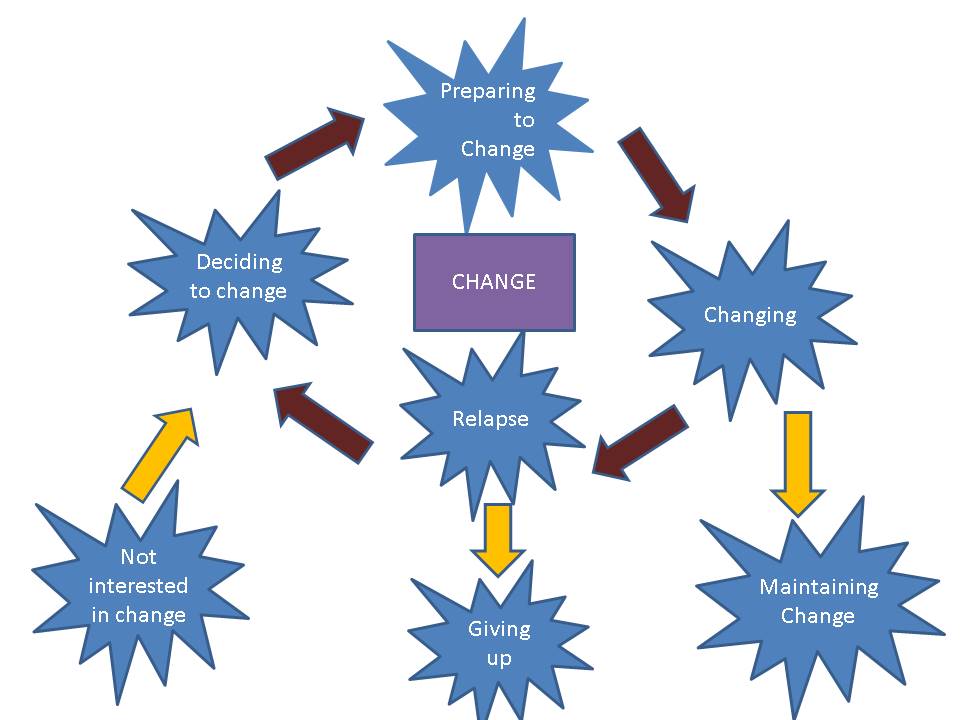As the New Year begins we have been talking about change and the change process and making New Year resolutions. Since it is a time of renewal where we each hope to gain clarity in our lives, you might wish to better understand change, and the elements of change.
Change often is about eliminating bad habits, or incorporating positive habits. And as you may already know, a habit, good or bad, can be a difficult thing to break.
Rest assured, there has been a great deal of research efforts invested in understanding how we make the decision to change, and how we are able to sustain change. Some of the premier researchers in this area have developed what is known as the Transtheoretical Model of Change.
The main point of the model is that change is a stage process, and that we make decisions about change throughout this process. In other words, change isn’t a one way street, but rather a busy intersection whereby we must consistently navigate to accomplish our goals.
The Stages of Change
A synopsis of the Transtheoretical Model of Change as it is broken down into stages looks like this:
Precontemplation is the stage we have no intention to change our behavior. Although people such as family members or doctors may encourage us. We are not interested in making changes.
Then there might be a “wake up call” such as a heart attack, divorce, or other life-threatening push that forces the change. At that point we may move into the next stage.
Contemplation is this stage we become aware that a problem exists and begin to seriously think about making a change, but have not yet made a commitment to take action.
This is the time in which we weigh the pros and cons of making a change. If the cons of making the change win (i.e. you will have to go on a diet and stop eating all the foods you love, etc.) we stagnate in this stage.
We then decide that we are not willing to pay the price involved in making the change. If the pros win (i.e. I will fit into my favorite jeans again and this horrible knee pain will go away, etc.), we may move into the next stage, which requires commitment.
Preparation is a stage in which we design our plan of action. We may remove temptation (i.e. cleaning out the cupboard, throwing out the cigarettes, joining the gym, etc).
Find your balance with our FREE 7-day guided meditations:
Action is the stage in which we actually modify our behavior. This is the challenging stage because it is where the “rubber meet the road” as it involves the most obvious behavioral changes and requires considerable commitment of time and energy.
If we are able to maintain the change then we move into the next stage which is actually the hardest because it is about keeping the new habits as integral parts of our lives.
Maintenance is the stage in which we work at preventing relapse, and consolidate the gains attained during the action stage. Here I should point out that the wrong changes at the wrong time may cause us to slip back into our old habits.
For example, if you successfully lose weight but still spend your time cooking the same old foods for the rest of your family, you may have difficulty maintaining your change. Therefore, big changes may be a lot harder to maintain for some of us.
Psychological Explanation of Change and Choices
The reason that it is important to understand the stages of change is that we have to apply different psychological tactics to every stage – whether we are going through the change ourselves, or supporting someone in their transition.
In the precontemplation stage we aren’t interested in change and consequently the work is done by the people who may have an investment in our change. They may lecture, cajole, educate and try to convince us to change, but we aren’t going to take any action no matter what they say!
If we heed their advice we may move into the contemplation stage and begin to address our ambivalence about change. What is useful during this stage is to make that pros and cons balance an actual list. Begin to do your own research about what is involved in the change, and identify barriers to success.
Be honest with yourself about which barriers are a reality, for example, you don’t have time to work out because you work 12 hour shifts, versus which barriers are just you making excuses for yourself not to take action.
The preparation stage is about making the plan and putting in play the resources to help. This is the time to identify the goals and make a realistic time line. Using the principle of Kaizen may be a way to approach the change
The action stage is the stage that we need to build in positive reinforcement for ourselves. While accomplishing our goals is a reward in itself, it may not be enough to sustain us on the action road.
We need to build in additional reinforcements. Depending on what the change process you are trying to accomplish is, it is important to find ways of rewarding yourself for maintaining the actions.
If your goal, for example, was to lose 50 pounds, perhaps you allow yourself to buy one new outfit for every 10 pounds that you lose. The reward can be anything you want that supports your change.
The maintenance stage is all about preventing relapse. So many of us have lost the same 10 pounds over and over again, haven’t we? We’ve sworn time and time again that, “This is the last cigarette” etc.
Conquering Your Change
Once we accomplish the goal, we often let go of the action steps and revert to old habits. Then we may reenter the change cycle. Stepping out of the cycle and into the maintenance stage is about continuing with the lessons learned in the action stage, and continuing to reinforce ourselves for being able to continue the behaviors that helped us meet our goals.
Here is my challenge to you:
First – try to recognize the cycle of change in others. Become an anthropologist and see if you can identify the decision-making process in others. Does a friend constantly complain about her weight but do nothing to alter her behavior? Have you witnessed a loved one on a downward health spiral that won’t take the advice of others to get more exercise?
Second – it’s time to apply what you learned to yourself and commit to the hard work of making your own changes. Are you stuck in a job you hate, but continually complaining about it? Do you feel like you just can’t “get it together” after a divorce or death in the family?
See if you can identify where you are in the change steps and work towards moving yourself into the next phase. Remember, you may always contact me for additional help.
Dr. Ines K. Roe has been helping women in transition rediscover themselves for over 20 years. If you’ve been feeling unfulfilled, are frustrated with your sense of accomplishment in midlife, or simply need guidance on your path to holistic well being, join her ecourses.




Leave A Comment